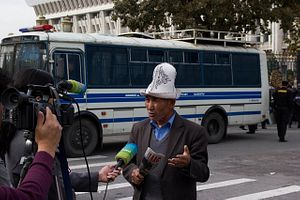Human rights abuses linked to the operations of Canadian mining businesses abroad took center stage in Geneva in June, when the UN Human Rights Committee addressed a series of concerns over Canada’s extractive industry’s record.
Canada is a global leader in the mining sector, and mining alone contributed $54 billion to Canada’s GDP in 2013. However, complaints about human rights violations and mistreatment of indigenous peoples by Canadian mining companies have accumulated over the years, prompting Amnesty International and the Canadian Human Rights Commission to raise the issue with the UN. Canadian firms have been accused of damaging the environment, with mass protests in South America and Central Asia. In Guatemala, Toronto-based Hudbay Minerals was criticized for its inability to stop the rape and murder of local environmental activists. The contractors of another Canadian mining giant, Barrick Gold, were allegedly involved in a mass rape of 137 local women aged between 14 and 80 in Papua New Guinea. In Kyrgyzstan, a Centerra Gold-operated mine triggered violent protests against the Canadian firm, which led to allegations that community activists were tortured by government forces and local police.
Across South America, Canadian mining companies have blatantly disregarded the rights of indigenous and tribal communities, says the Working Group on Mining and Human Rights in Latin America. In its report to the Inter-American Commission on Human Rights last year, the group claimed that Canada’s mining businesses have been engaged in the consistent “establishment of large-scale mining projects on indigenous peoples’ lands, in communities of persons of African descent, and in rural farming communities, without taking account of the particular quality of those territories, the special protection to which they are subject, and the prohibition against extractive operations in many such areas.”
Similar allegations of misconduct were reported in Central Asia, where Centerra Gold operates the Kumtor mine, one of the biggest open pit projects in the region. In striking resemblance to anti-mining protests in Latin America, local communities in Kyrgyzstan staged acts of public disobedience in the summer and autumn of 2013 to draw attention to urgent social and environmental issues in the villages located near the gold project. And just as in South America, opposition to Canadian mining in Kyrgyzstan was met with a brutal crackdown on the protest movement by the authorities. Environmental and local community activists who took to the streets rallying against Centerra Gold were arrested and allegedly tortured by the Kyrgyz riot police and security services. (A Centerra Gold spokesperson declined to speak with The Diplomat.)
In Africa, the Tanzanian unit of one of Canada’s largest mining companies, Barrick Gold and a subsidiary were liable, “through complicity, for killing and injuring of locals at the North Mara mine by police guarding the mine,” says MiningWatch Canada, a pan-Canadian environmental and social justice group. According to the watchdog, violence at the North Mara project was allegedly perpetrated by mine security and local police. Likewise, allegations of extreme violence, killings, and the mass rape targeting local women in Papua New Guinea, where Barrick Gold has managed the Porgera mine, triggered a global response to the company’s practices from international nongovernment organizations (NGOs) and the media. Barrick Gold’s was also called out by the local alliance Justice Foundation for Porgera for the “catastrophically changed” subsistence and livelihoods of landowners in Papua New Guinea.
In 2012, a coalition of Mongolian and Canadian NGO’s submitted a complaint about Centerra Gold’s misconduct to the Canadian National Contact Point (NCP), under the OECD guidelines for Multinational Enterprises. Mongolian environmentalists and activists were critical of the Canadian company, claiming it had violated local community rights, and lambasted its environmental record at the Boroo and Gatsuurt gold mines. Canada’s NCP didn’t find the allegations substantiated but urged Centerra Gold to engage in a dialogue with local communities in its areas of operations in Mongolia.
Mongolian villagers remain gravely concerned about the environmental impact on their local way of life given Centerra’s controversial performance with the Boroo project. The executive director of the Mongolian NGO OT Watch, Sukhgerel Dugersuren, told The Diplomat via e-mail that in the specific case of the Gatsuurt gold mine, the Canadian government’s “NCP violated its own procedures in order to protect [Centerra Gold] corporation’s interest as well as its duty to promote exports. Certainly, Canada could do more but I do not really see [the] current Canadian government demanding that its corporations truly apply the best mining standards in poor countries as that would go against companies’ bottom lines.”
In Geneva, Amnesty International urged UN Human Rights Committee to recommend venues that would let foreign litigants and victims pursue legal action against mining firms in the Canadian courts. Sakura Sanders, environmental activist and organizer at Toronto-based grass roots nonprofit organization Mining Injustice Solidarity Network told The Diplomat that Canada has no laws “to prevent human rights abuses at Canadian mine sites around the world. There are many things that can change this, such as investigating and imposing sanctions of government support if they are found to be abusing human rights or causing environmental harm. Another initiative has been suggested to make it easier for victims of abuse to sue in Canadian courts, as many of these offenses are occurring in countries with dysfunctional legal systems.
Indeed, Canada has ignored the complaints about Canadian mining companies in foreign states, even those involving topics such as corruption and bribery that are targeted domestically in anti-corruption laws. Despite Ottawa’s efforts, as popular Canadian magazine Maclean’s pointed out this year, Canada is still “soft on bribery” and “can no longer pretend it is not seeing” corrupt schemes by Canadian mining businesses abroad.
Ryskeldi Satke is contributing writer with research institutions and news organizations in Central Asia, Turkey and the U.S. Contact e-mail: rsatke at gmail.com

































